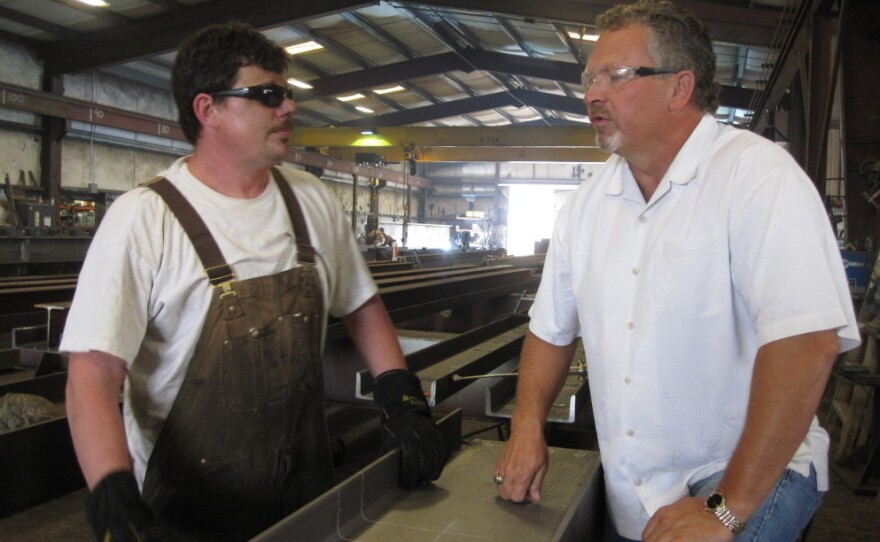Fourth of a five-part series
Despite the weak economy, Precision Iron Works — a small business in Pacific, Wash. — is hoping to expand, but government rules and regulations are making it more difficult, its president says.
Steve Leighton, a large and outgoing guy, has been the head of Precision Iron Works since the company was founded 20 years ago. His presidential office — a modest space upstairs above the factory — is filled with blueprints and construction drawings.
"If you think about having a drawing that would show how bits and pieces go together, we actually fabricate the pieces: the columns, beams, braces. The skeleton of a building — that's what we produce," he says.
Downstairs in the production area, about 35 workers cut huge sheets of metal into somewhat smaller pieces that they will weld and paint. Then they'll use giant forklifts to transfer finished products to trucks and barge trailers to ship the material out to project sites.
"We've got probably one of the best groups I've ever been around," says Tony Owens, the shop foreman. "Good workers, good guys in general makes the job a lot easier."
One of those workers is Mitch Mercill.
"I've been doing this since I was in high school, and I am in my 50s now," Mercill says. "And I don't — I wouldn't mind doing this till the day I could retire."
But finding workers like him is difficult. For months, the company has been advertising several job openings without much success.
The company says there's not much interest in gritty, physically demanding work.
Losing Out
And staffing is just one of many challenges facing Precision Iron Works as it tries to double its revenues from about $10 million to $20 million a year.
A state law that's been on the books for more than a half-century requires Washington companies to pay their workers a prevailing wage — or an hourly rate set by the government — on state-funded projects.
But as Precision's Leighton explains, companies in states like Idaho and Utah, which don't have prevailing wage laws, can pay their workers less.
"It puts us at such a disadvantage," he says. "There could be a project right out on our backdoor out here that I can't get because a company in Utah gets such a competitive advantage by not having to pay these rates."
Leighton says that's what happened a few months ago when he bid on a large middle school project in a nearby county.
"It was about a 10- or 12,000 man-hour project — one that was right up our alley," he says. "We beat out all the other of our competitors in this state — felt that we had a good number — but got beat out by three out-of-state companies."
Unintended Consequences
Prevailing wage rules were put in place so workers would get a living wage, but on a job like this one, Leighton says the difference could be $10 an hour per worker.
State Sen. Steve Conway, a Democrat, agrees that the rules can make it difficult to compete against out-of-state firms.
"It does have unintended consequences," he says. "We need to figure out a solution to this."
For now, at least, Precision is likely to bid on fewer state-funded projects, and that means fewer choices and chances to win large contracts close to home. The company is now looking for projects in places like Alaska and Guam.
There are other rules and regulatory hurdles, too. Washington's Secretary of Commerce Rogers Weed says environmental standards and other rules can be harder on small companies than large ones.
"Complying with regulations is something that adds burden to small businesses, and they can't, if you will, amortize that cost across a larger base of business and employees," he says.
But more than anything else, the biggest factor in Precision's success and potential for growth is the economy. If it doesn't pick up, there will be even fewer projects. Profit margins that have already slid from about 20 percent to 5 percent could become slimmer. Still, Leighton is hopeful.
"I don't think it's scary — I wouldn't be doing this if I thought it was scary," he says. "If I was looking through the rear-view window, I think I would just pack it up and go. But I guess I believe in what we are doing here."
And he says that means helping blue-collar workers provide for their families.
Copyright 2022 NPR. To see more, visit https://www.npr.org. 9(MDAzMjM2NDYzMDEyMzc1Njk5NjAxNzY3OQ001))






